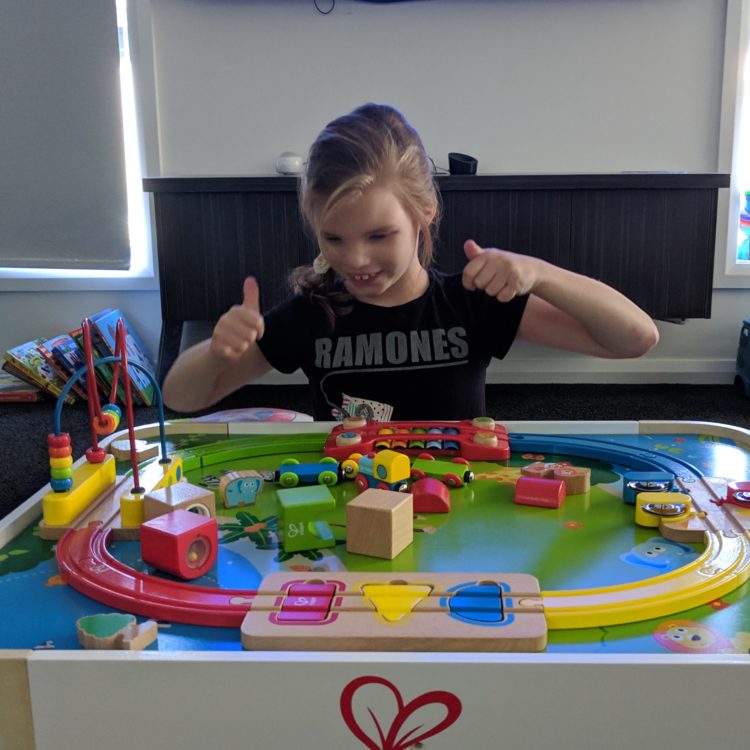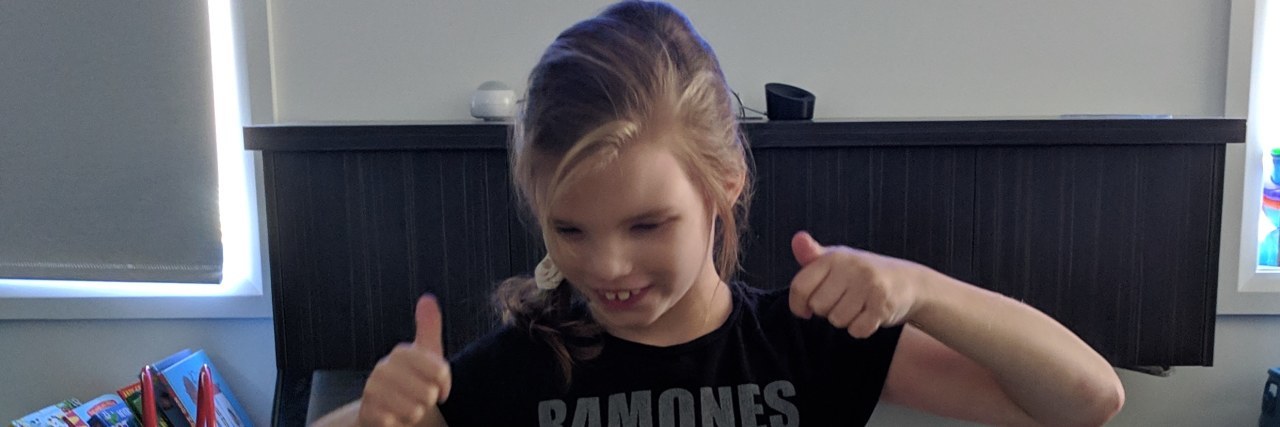The Blog I Wish I Read When My Baby Was Diagnosed With a Genetic Disorder
Ella is almost 8 now and while in the scheme of things I guess that’s not very long, I still feel like I’ve got experience to share. Ella was 3-weeks-old when she was diagnosed with Cri du Chat syndrome. This post I’m writing is what I wish I had read, way back then.
But this isn’t about me, dear reader, it’s about you. Maybe you’ve just received a diagnosis of a genetic disorder for your baby, or one of the umpteen other possible diagnosis out there. Welcome to the club that no one wants to be part of. I can promise you that this club, with all of its ups and downs, is full of amazing, inspirational and strong people. No matter how you’re feeling right now, in this moment, you can get through it.
Here are nine things I have learned through my experiences, that I hope can help you along your journey.
1. Breath.
Just…breath. Sometimes you’ll feel like you can’t do it, like it’s too hard. In eight years I’ve felt like I couldn’t handle it countless times, and you know how many times I’ve handled it? All of them (so far) and I’m nothing special.
So take your moment, (hell, take 10!) to refocus your energy. And while your world may be falling apart, remember you are the world to a little person. So take your moment, scream into pillows, pace, rant, cry in the shower, do whatever you need to do…and then (this is the important bit) pick yourself up and continue to be the world for your child. You’re a bad ass, you got this.
2. Be kind to yourself.
You’re not perfect, nobody is. You will make mistakes, you will falter, you will sometimes make the wrong choice. Try not to feel guilty for your feelings… they are valid, always. When Ella was diagnosed and I was staring down this dark barrel of the unknown and in my darkest moments, I wished things I’m now ashamed of. I felt like I didn’t want her, I felt like I had failed her already. Like I couldn’t do it. I was depressed. You can’t help the way you feel, and there is nothing wrong with getting help to work through those feelings until you can get to a place of acceptance.
And don’t feel guilty for decisions you’ve already made. It might be a therapy that turned out to be useless, or a surgery that didn’t fix what it was supposed to (I had Ella’s tonsils and adenoids out when she wasn’t even 2, yet after being told it will fix her breathing issues…it didn’t). As long as you’re making the best decision you know how, with the information you have at the time, you’re doing OK. Remember, hindsight is always 20/20.
3. It’s OK to be mad.
In fact, it’s probably really normal to be mad! Furious! Nobody likes it when their plans are changed without any warning. So go ahead and rage at the diagnosis, at the doctor who informed you, at the circumstance and the whole damn world. But if you find yourself dwelling in this place of anger, find some help to get passed it, because the best is yet to come.

4. Focus on the now.
When Ella was diagnosed I remember reading all about Cri du Chat. I remember so clearly I was stressing what school would Ella go to. It went something like this…
“OMG what am I going to do? There’s no specialist school in my town. Would she be able to go to mainstream? I’m going to have to move house, how will I afford that?”
And it went on, and on, and on. Eventually while lamenting over this, another (much smarter and wiser) parent of a child with a disability laughed and pointed out that, “Ella is 1-month-old you dill,” and not to focus on things that are five years away.
So that’s my advice to you — focus on what you can. Whether that be only a year from now, a month, a week or even the next hour. The funny thing about the future is, it’s not going anywhere.
5. Don’t be afraid to say no!
You are now an advocate. I will always advocate listening to the doctors, therapist and experts. They have hopefully studied and know all about your child’s condition, but you know your child. The experts can be wrong. For example, I was told Ella would never walk and yet by 5-years-old, she could! That being said, there were several times I stopped physio session half way because I knew she’d had enough, or pushed her to finish because I knew she could. So it’s OK to to say “no, he’s had enough,” or “no, he can learn this.”
6. Find your humans, ones you can turn to.
The biggest thing is you’re not alone. There are others like you out there, you just have to find them. I thought I would never find anyone “like me” (swears, single at the time, drinks, acts young even though I’m totally not, coffee addict). I even wrote a post about it. But I did, I found people like me, and people that aren’t. Some are parents of typical children, some have children with disabilities and some aren’t parents at all. One of my biggest supporters is a lady that I used to work with many many years ago, who lives over the other side of the country. But she’s always the first to give me feedback and have a chat. So I can’t stress this one enough — find your support however that looks for you. It could be religious groups (totally not my thing, but some people find it so helpful), mothers’ meetings, therapy or Facebook groups. Find someone you can talk to.
7. Ask for help.
Throughout the years I’ve learned that people want to help, especially your friends. But they might not know how. If you’re struggling, ask! Like I already mentioned, hopefully you have some support. Call your friends, tell them if you need help and (this is the hard bit) how to help you. You might need someone to do some laundry while you’re staying in the hospital, or someone to take the other kids while you have an appointment with your kiddo with a disability. You might even just need someone to come over for a coffee to listen, or take the kids while you get a rest. The bottom line is, you can’t do it all and you don’t have to.
8. Nothing has changed.
Not really anyway. Something that’s always made me feel better is knowing the sun will set tonight, and rise tomorrow, and everything will carry on. Yes, your life feels like it has turned upside down. And the future might be very different than the one you once imagined, but he’s still the precious baby you loved yesterday, and the day before that, and the day before that. And you will still love him tomorrow, and all the days after.
9. It will be OK.
No, really. It will.
Have these tips been helpful? Is there anything you would add? Tell us in the comments.
A version of this story originally appeared thehonestpirate.com.
Photo submitted by contributor.

